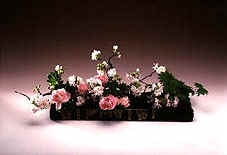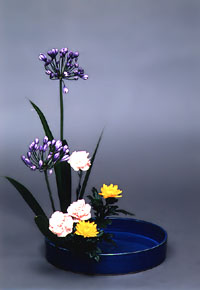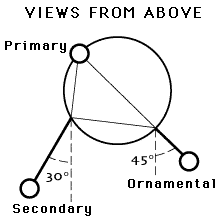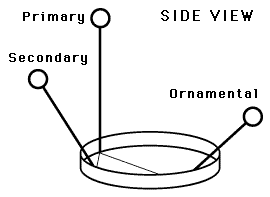|
Types of Ikebana-Moribana
 Moribana
uses a shallow container and a kenzan, a holder with many sharp points
into which flowers are inserted. The big feature of moribana is the
broad expanse of natural-looking shapes and a mound of beautiful
flowers. Moribana
uses a shallow container and a kenzan, a holder with many sharp points
into which flowers are inserted. The big feature of moribana is the
broad expanse of natural-looking shapes and a mound of beautiful
flowers.
 While
the heika style was developed many centuries ago and has a lot of
rules, moribana is only about a hundred years old and is not as fussy.
Western flowers can be used, for instance, and the arranged flowers
may be placed in Western-style rooms and entranceways--not just in the
tokonoma, the alcove of traditional Japanese-style rooms. While
the heika style was developed many centuries ago and has a lot of
rules, moribana is only about a hundred years old and is not as fussy.
Western flowers can be used, for instance, and the arranged flowers
may be placed in Western-style rooms and entranceways--not just in the
tokonoma, the alcove of traditional Japanese-style rooms.
There are
different types of moribana depending on the length and angle of the
primary, secondary, and ornamental stems. The upright style is the
most common; it exudes a feeling of stability and gravity. In this
style, the primary stem is about as long as the diameter and depth of
the container combined, with the secondary stem being around two-thirds
and and the ornamental stem about half the length of the primary
branch.
 The
primary stem is placed vertically, while the secondary stem is tilted
45 degrees and scattered over a 30-degree area to the front and left.
The ornamental stem is tilted 60 degrees and placed across a 45-degree
area to the front and right. Seen from above, the three stems form a
right triangle. Flowers are placed inside this triangle to fill out
the shape. The
primary stem is placed vertically, while the secondary stem is tilted
45 degrees and scattered over a 30-degree area to the front and left.
The ornamental stem is tilted 60 degrees and placed across a 45-degree
area to the front and right. Seen from above, the three stems form a
right triangle. Flowers are placed inside this triangle to fill out
the shape.

Photos: Moribana
(Photos courtesy of Ohara School of Ikebana. |
